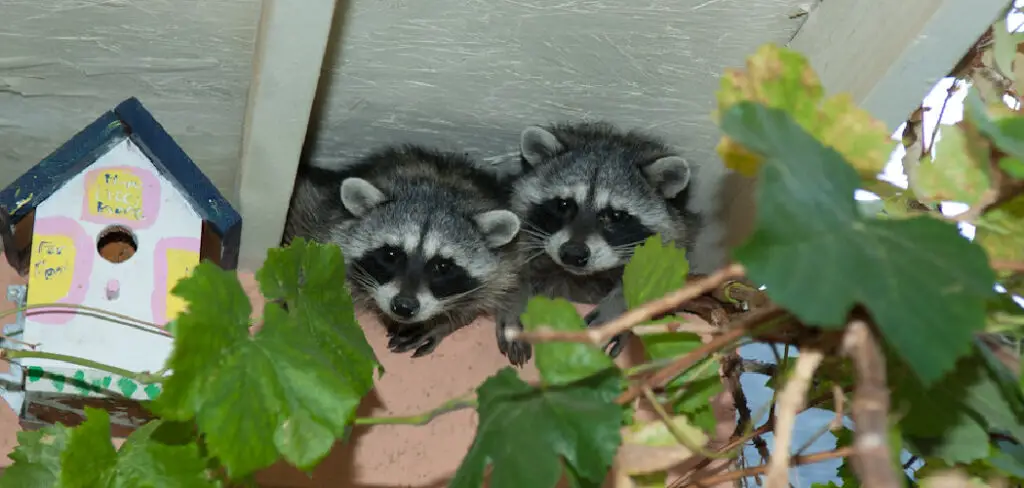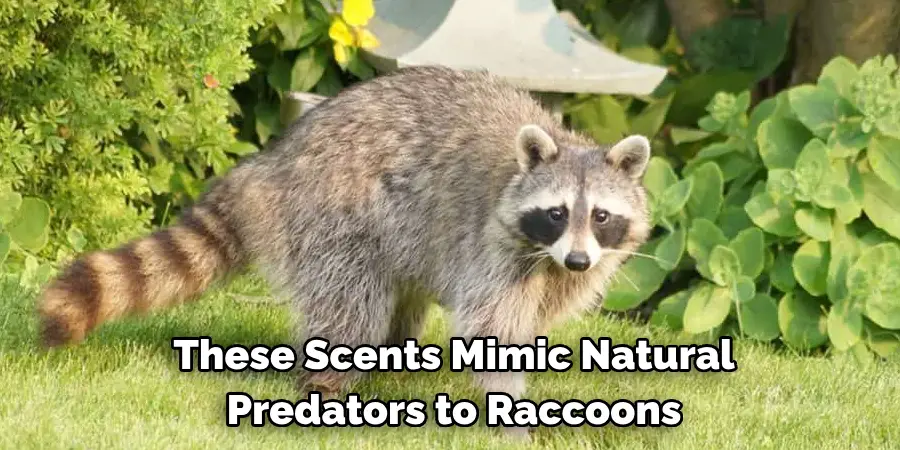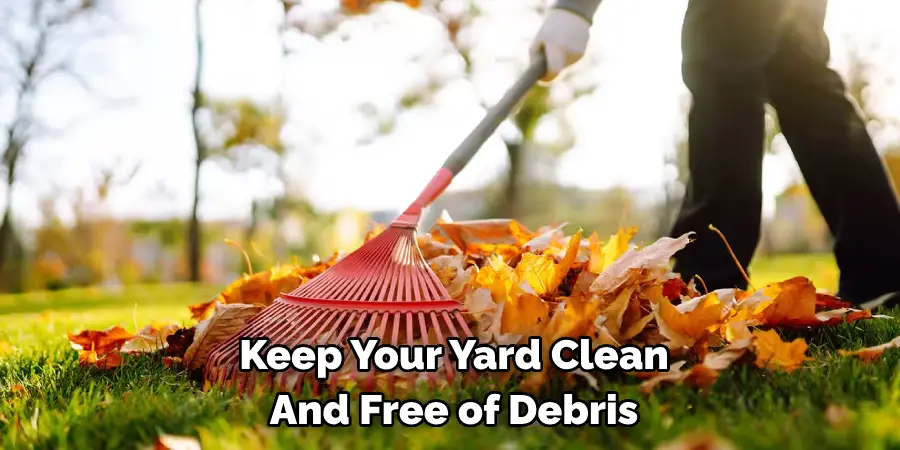Have you recently noticed more and more raccoons rooting around in your yard at night, getting into your trash cans, and wreaking havoc? You’re not alone. Raccoon populations have been steadily increasing in urban and suburban environments, as these clever creatures have learned to take advantage of the ample food sources readily available near human homes.

But while raccoons can be entertaining to watch from afar, having a family of them set up camp in your yard long-term is not ideal. Their foraging and marking behaviors can end up making a real mess of things.
In this post, I’ll share several effective humane methods for how to get racoons out of yard, allowing you and your family to reclaim the peaceful enjoyment of your outdoor space once more.
What Are Racoons and Why Are They in My Yard?
Raccoons are medium-sized mammals native to North America. They have a distinctive black “mask”, bushy ringed tails, and dexterous front paws which they use to manipulate objects much like human hands. Raccoons are omnivores, meaning they eat both plants and animals and will take advantage of any food sources they can find. They are attracted to yards because of the easy access to food, shelter, and water sources such as pet food left outside, open trash cans, bird feeders, and small ponds or pools.
Why You Should Want Racoons Out of Your Yard?
While raccoons may seem cute and harmless, they can cause quite a bit of damage to your property. They are notorious for digging up lawns in search of grubs and insects, tearing through garbage bags and making a mess, and even damaging gardens or crops. They can also carry diseases such as rabies, roundworms, and leptospirosis, which can be harmful to both humans and pets. Therefore, it is important to take steps to get raccoons out of your yard and discourage them from returning.

10 Best Ways on How to Get Racoons Out of Yard
1. Use Bright Lights and Loud Noises:
Raccoons are nocturnal animals, so they prefer to do their activities at night. Using bright lights and loud noises in the yard, can disrupt their sleep patterns and make your property less desirable for them. Motion-activated floodlights or playing a loud radio throughout the night near where raccoons frequent will help drive them away. Using flashing lights or a strobe light can also be effective as raccoons do not like fast-paced, unpredictable movement.
2. Use Repellants:
Several natural repellents are effective in deterring raccoons from your yard. These include predator urine, such as coyote or fox urine, ammonia-soaked rags, and peppermint oil. These scents mimic natural predators or irritants to raccoons, making them want to stay away from the area. This method is best used in conjunction with other tactics to reinforce the message that your property is not a welcoming place for raccoons.
3. Install Physical Barriers:
One of the most effective ways to keep raccoons out of your yard is by installing physical barriers such as fences or mesh netting. Raccoons are skilled climbers, so make sure to use fencing with a smooth surface that they can’t grip onto. Alternatively, you can install an electric fence specifically designed for raccoons. This type of fence is safe and will give the animals a harmless shock if they try to climb over it.
4. Secure Trash Cans and Compost Bins:
Raccoons are notorious for getting into trash cans and compost bins, so make sure to secure them tightly with bungee cords or locking lids. Keep trash cans away from your house and clean them regularly to remove any lingering food smells that may attract raccoons. If you have a compost bin in your yard, consider using a tumbler-style bin with a tight-fitting lid. This will make it harder for raccoons to access and also help speed up the composting process.

5. Remove Food Sources:
As opportunistic eaters, raccoons will take advantage of any easily accessible food sources in your yard. Make sure to remove or limit these food sources to discourage them from sticking around. This includes securing pet food indoors at night, removing fallen fruits and nuts from trees, and picking up any spilled birdseed. If you have a vegetable garden, consider using a fence or chicken wire around it to prevent raccoons from snacking on your plants.
6. Use a Motion-Activated Sprinkler:
A motion-activated sprinkler is another effective method to keep raccoons out of your yard. These devices release a sudden burst of water when triggered by movement, startling and scaring off any critters in the area. Raccoons do not like getting wet, so this can be an efficient way to deter them from returning. Just make sure to turn off the sprinkler during the day when you or your family are using the yard.
7. Utilize Commercial Deterrents:
There are also several commercial deterrent products available on the market designed specifically for raccoons. These include ultrasonic sound emitters, which emit high-frequency noises that irritate raccoons, and motion-activated sprinklers with built-in ultrasonic sound. You can also find granular or spray repellents that use natural ingredients to make your yard unappealing to raccoons.
8. Make Your Yard Less Appealing:
Raccoons are attracted to yards because they provide a comfortable and safe shelter for them. To make your yard less appealing to raccoons, make sure to keep it well-maintained and tidy. Trim back any overgrown vegetation and remove any piles of debris or wood that can serve as potential den sites for raccoons. This will make your yard less attractive to these animals and also prevent them from making a home on your property.

9. Use Traps:
If all else fails, you can use humane traps to catch raccoons and relocate them to a more suitable habitat. Make sure to check with your local wildlife agency for regulations regarding trapping and relocating raccoons in your area. It is also important to release the raccoons at least 10 miles away from your property to prevent them from returning. Using food as bait, such as canned tuna or marshmallows, can increase the chances of catching a raccoon.
10. Seek Professional Help:
If you are having persistent problems with raccoons in your yard, it may be best to seek professional help. Wildlife control experts can assess the situation and provide safe and effective methods for removing raccoons from your property. They can also offer advice on how to prevent future infestations and make your yard less attractive to these animals.
Following these 10 best ways how to get raccoons out of your yard will help you effectively and humanely deal with any unwanted visitors.
Remember, it is important to take action as soon as you notice signs of raccoons in your yard to prevent any potential damage or health risks. With patience and persistence, you can successfully keep raccoons away and maintain a raccoon-free yard. So, do not let these mischievous creatures take over your property, and put these methods into action today!
Additional Tips and Tricks to Get Racoons Out of Yard
1. If you have a pet or children, it is important to take extra precautions when trying to get raccoons out of your yard. Raccoons can be unpredictable and may become aggressive if they feel threatened.
2. Keep an eye on your trash cans and make sure they are tightly sealed. Raccoons are often attracted to food sources, so keeping your trash secure will help deter them from entering your yard.
3. Consider removing any potential food sources from your yard, such as pet food or bird feeders. These can be easy targets for raccoons and will only encourage them to keep coming back.
4. Install motion-activated lights or sprinkler systems in areas where raccoons may frequent. This can startle the animals and make them think twice about returning to your yard.
5. If you have a garden, consider using natural deterrents like hot pepper spray or predator urine around the perimeter. Raccoons have sensitive noses and these scents can help keep them away.

6. Keep your yard clean and free of debris that could provide shelter for raccoons. This includes piles of wood, bushes, and overgrown vegetation.
7. If all else fails, contact a professional animal control service for assistance. They will have the knowledge and equipment to safely remove raccoons from your property.
8. Remember, it is important to never attempt to trap or handle raccoons on your own. They can carry diseases and may become aggressive if they feel threatened.
9. Consider installing a fence around your yard to prevent raccoons from entering. Be sure the fence is at least 3 feet high and extends underground to prevent them from digging under.
10. Finally, be patient and persistent. Getting rid of raccoons may take time and multiple attempts, but with these tips and tricks, you can successfully get them out of your yard for good. Good luck! That’s it for our guide on how to get raccoons out of your yard.
Following these tips and tricks, you should be able to successfully remove raccoons from your property. Remember to always prioritize your safety and the safety of those around you when dealing with wild animals. With patience and determination, you can peacefully coexist with these curious creatures without them causing any harm or damage to your yard or home. Happy raccoon-proofing!
Preventive Tips for Raccoon Control
1. Secure Your Trash Cans:
One of the main reasons raccoons are drawn to yards is because of easily accessible food sources, such as unsecured trash cans. To prevent raccoons from making a mess in your yard, make sure all trash cans have tight-fitting lids that cannot be easily opened by animals. This will make it harder for raccoons to access food and will discourage them from frequenting your yard.
2. Eliminate Potential Shelter:
Raccoons are also attracted to yards that offer shelter, such as piles of wood or overgrown vegetation. Keep your yard clean and free of debris to eliminate potential hiding spots for raccoons. Trim any trees or bushes that may provide easy access to your roof or attic, as these are common areas for raccoons to seek shelter.

3. Seal Entry Points:
Inspect your home for any potential entry points that raccoons could use to gain access to your attic or crawl space. These can include loose vents, damaged screens, or gaps in the foundation. Seal off these entry points with heavy-duty materials such as wire mesh or metal flashing to prevent raccoons from getting inside.
4. Use Motion-Activated Lights and Sound:
Raccoons are nocturnal animals, so they are naturally afraid of bright lights and loud noises. Install motion-activated lights around your yard and near potential entry points to startle raccoons and discourage them from entering your property. If possible, you can also set up motion-activated sound devices that emit noises that raccoons find unpleasant. These devices can be found at most home improvement or pest control stores.
5. Keep Pet Food Indoors:
If you have outdoor pets, make sure to bring their food bowls indoors after they have finished eating. Leaving pet food outside overnight can attract raccoons and other animals to your yard. If you must leave pet food outside, consider investing in a motion-activated feeder that will only dispense food when your pet approaches.
6. Use Natural Repellents:
Several natural repellents can be used to deter raccoons from entering your yard. These include peppermint oil, cayenne pepper, and predator urine (which can be purchased at most garden supply stores). Scatter these repellents around potential entry points and in areas where raccoons have been seen to create an unpleasant scent barrier.
These are the key preventive tips to control the presence of raccoons in your yard. By following these measures, you can discourage raccoons from making a home in your yard and avoid potential conflicts with these wild animals. Remember, it is always best to try non-lethal methods of control before resorting to more extreme measures such as trapping or contacting professional pest control services. Let’s coexist with nature and keep our yards safe for both humans and wildlife! So, follow these tips and enjoy a raccoon-free yard.
Common Mistakes to Avoid While Trying to Get Racoons Out of Yard
1. Raccoons are attracted to the scent of food, so make sure that you cover up your trash cans tightly. If possible, keep them locked away in a shed or garage until garbage pick-up day. Leaving food sources out overnight will only encourage raccoons to keep coming back.
2. Avoid leaving pet food outside, especially at night. Raccoons are opportunistic and will not hesitate to help themselves to any available food sources.

3. Do not intentionally feed or leave out food for raccoons. This may seem like a kind gesture, but it will only make the problem worse. Raccoons are quick learners and will keep returning to your yard for more food.
4. Do not attempt to trap or remove raccoons on your own. Not only is this dangerous, but it is also illegal in many areas without a permit. It is best to contact a professional wildlife removal service for assistance.
5. Avoid using bright lights or loud noises to scare away raccoons. This may temporarily startle them, but they will quickly adapt and return once the noise or light goes away.
6. Do not underestimate the strength and agility of raccoons. They are skilled climbers and can easily scale fences or trees to access your yard. Make sure all possible entry points are secured, such as weak spots in fencing or holes in sheds and garages.
7. Avoid using repellents or deterrents, as they are usually ineffective at keeping raccoons away. In some cases, these products may even attract raccoons to your yard.
8. Do not attempt to handle or approach a raccoon, especially if it appears sick or injured. Raccoons can carry diseases such as rabies, and it is best to leave their removal to trained professionals.
9. Avoid using poison or lethal traps to get rid of raccoons. This can not only harm the animal but also pose a risk to other pets or wildlife in the area.
10. Lastly, do not give up too soon. Removing raccoons from your yard may take time and persistence, but with the right methods and precautions, you can successfully get raccoons out of your yard for good. Remember to always put safety first and seek professional help if needed.
By avoiding these common mistakes, you can effectively and safely get raccoons out of your yard. It is important to understand the behaviors and habits of raccoons to come up with a successful plan for removal. Remember to always prioritize the safety of yourself, your family, and the raccoons during this process. With patience and diligence, you can successfully rid your yard of raccoons and prevent them from returning in the future. So, stay vigilant and take necessary precautions to keep your yard free from pesky raccoons! Happy removal!
Conclusion
With the above outlined you can easily learn how to get racoons out of yard and keep them out. Remember to always clean up any food sources and seal garbage cans tightly, use bright lights and loud sounds to scare them away, and set humane traps if necessary.
Additionally, it is important to know that raccoons are opportunistic creatures and will often seek shelter in residential areas due to the availability of food and warmth. To prevent future encounters with raccoons, it is important to remove any potential food sources such as fallen fruits and nuts, keep pet food indoors, and secure any outdoor structures or openings that could serve as a den for raccoons.
Furthermore, it is important to note that raccoons can carry diseases and should not be handled without proper protection. If you are unsure of how to safely remove a raccoon from your yard, it is recommended to seek professional assistance from a wildlife control company.
About
Outdoor Fixes is a distinguished figure in the world of Diy design, with a decade of expertise creating innovative and sustainable Diy solutions.
His professional focus lies in merging traditional craftsmanship with modern manufacturing techniques,
fostering designs that are both practical and environmentally conscious. As the author of diy,
outdoorfixes delves into the art and science of outdoorfixes-making, inspiring artisans and industry professionals alike.
Education RMIT University
(Melbourne, Australia) Associate Degree in Design (Outdoor Fixes) Focus on sustainable design, industry-driven projects,
and practical craftsmanship. Gained hands-on experience with traditional and digital manufacturing tools, such as CAD and CNC software.
Nottingham Trent University
(United Kingdom) Bachelor’s in outdoorfixes.com and Product Design (Honors) Specialized in product design with a focus on blending creativity with production
techniques. Participated in industry projects, working with companies like John Lewis and Vitsoe to gain real-world insights.
Publications and Impact
In diy, Outdoor Fixes his insights on indoor design processes, materials, and strategies for efficient production.
His writing bridges the gap between artisan knowledge and modern industry needs, making it a must-read for both budding designers and seasoned professionals.

